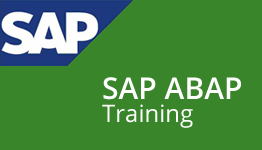About SAP ABAP Online Training
SAP ABAP training illustrates the concepts from the ground level i.e. they begin with the core fundamentals to make the learner strong enough and to program well in the SAP enterprise systems. The learner could observe the author performing different operations with their step-step instructions.
Course Objective:
This course ensures that the user would write & test the code in no time. This course ensures that the learners are not only provided with the theoretical approach towards concepts but there is pack filled and practical approach followed by the relevant examples which helps the user to learn and code easily in step by step procedure.
Who can Learn this course?
Fresher’s with the basic programming Skills can learn SAP. Any of the IT Guy from the Programming Background can grasp the logics easily. People who ever been working in “SAP Functional Modules” too can learn SAP ABAP easily.
Prerequisites
Sound knowledge on Java and C++ would help the learners to understand the concepts at its best.
Knowledge on Database can boost once learning methodologies.
Why Learn SAP ABAP?
SAP ABAP is originally the report language for SAP R/2, and it’s a platform which enables large corporations to build the mainframe business applications for Financial, Materials Management, and Accounting Management.
ABAP (Advanced Business Application Programming) includes Logical Databases (LDBs) which provides high level of abstraction i.e. from basic level to the database level.
ABAP programming language in different situations :
- When used by the developers – to develop SAP R/3 platform.
- When used by the SAP customers – to enhance the applications of SAP. (i.e. the customers could develop the custom reports and
interfaces by ABAP programming).
SAP ABAP Online Course Summary
This online course is been designed by SAP(ABAP) Experts to enhance and expertise the skill set of SAP (ABAP) and our expertise professionals train the learners to become the successful SAP developers.
The topics covered under this course are as follows:
ABAP Contents ERP
• Introduction
• Why ERP??
• Accelerated SAP (ASAP)
• Preparation of Project
• Business- Blue Print
• Realization
• Preparation-(Final)
• Go-Live and Support
SAP R/3 Architecture
• Distributed architecture
• Centralized architecture
• 2-tier architecture
• 3-tier architecture
• Landscape & Implementation Lifecycle
Software Development Overview
• SAP Landscape Overview
• Landscape types
• Concepts of Lifecycle Implementation
Introduction to ABAP
• Getting Started
• SAP Logon Details
• SAP Easy Access
• Package builder
• Object Navigator
• ABAP Workbench
• Workbench Overview
• Detailed Information on Repository Objects
• ABAP Dictionary
• Database tables
• Views
• Type groups
• Domain
• Data types
• Search Help
Basic Programming
• Data types - ABAP editor
• Data Functions
• String Functions
• Arithmetic Functions
• System Fields
Formation Techniques
• Icons
• Hotspot
• Color
• Symbols
Selection-screens
• Tabs
• Select-options
• Blocks
• Parameters
• Comments
• Work-Area
• Explicit Work Area
• Implicit Work Area
Control statements
• Conditional statements
• Looping statements
• Branching statements
User defined Non-Elementary data type
• Field Groups
• Field String
• Field Symbols
ABAP database Access
• Open SQL
• Native SQL
• Internal Table
• With Header line
• Types of Internal tables
• Without Header line
Modularization
• Source code
• Function builder
• Subroutines
• Macros
• Include
• Procedure
Reports
• Interactive Reports
• Classical reports
• Drill down Reports
• ALV(ABAP List Viewer)
Screen Objects
• Attributes
• Screen Painter tool
• Dynpro
• Table Control
• Frames
• Input/output Fields
• Tab strip
Implementation and processing
• Text Fields
• Status Icon
• List Box
• Pushbutton
• Check Box
• Subscreen
Developer Tools
• ABAP/4 Runtime Analysis
• ABAP/4 Debugger
• Performance Tuning
• SQL Trace
Data Transfer Procedure
• Transfer Procedure Overview
• Local and Sequential files
• Data formatting and analysis
• Session Method
• Call Transaction Method
• Batch Input
• Transaction Recorder
• LSMW
• Scheduling Data Transfer in Background processing
SAP Script
• SAP Script Overview
• Form Painting - General concepts
• Pages
• Windows
• Paragraph
• SAP Script Style
• Header
• Page windows
• Character Format
SMART FORMS (Concepts)
• CROSS APPLICATIONS
Introduction to Distributed technologies
• Why Distributed technologies??
• General Concepts
• IDOC
• RFC
Types of Distributed technologies
• ALE
• BAPI
• EDI
Enhancement Technologies
• Menu exits
• User exits
• ITS
• Workflow
• CMOD and SMOD
• Screen exits
• BADIS
Other
• Real-Time Scenarios
• Implementation Project
• Implementation Skills
• Maintenance Project
ABAP Concepts
• Functional Exposure with Real-Time scenarios
• In MM/SRM
Frequently Asked Questions
Reviews
Not reviewed yet
